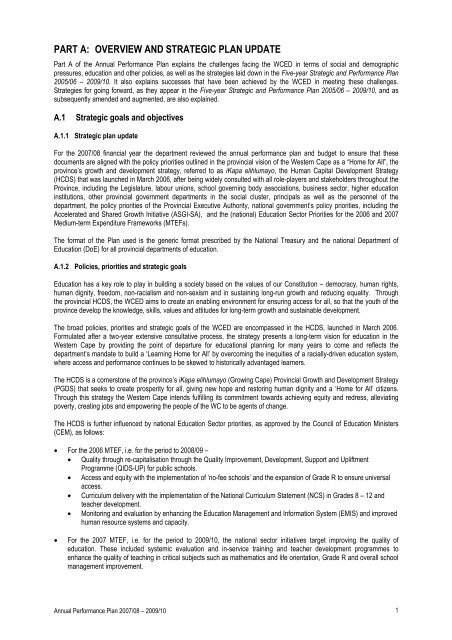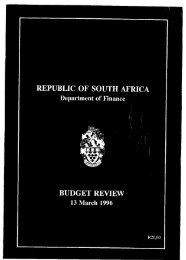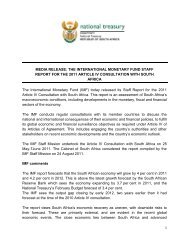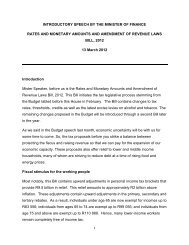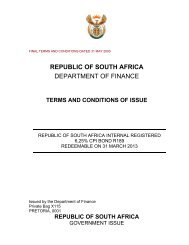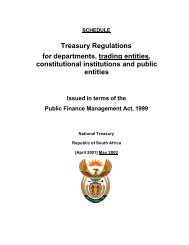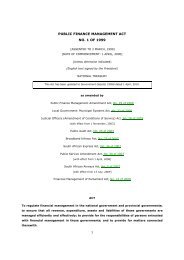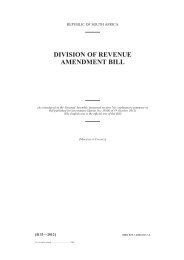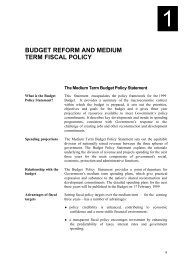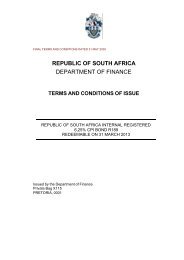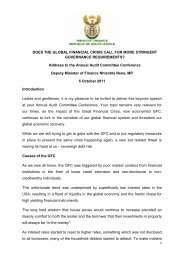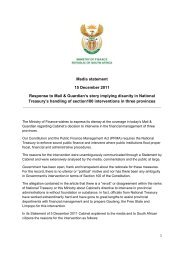Annual Performance Plan Jaarlikse ... - National Treasury
Annual Performance Plan Jaarlikse ... - National Treasury
Annual Performance Plan Jaarlikse ... - National Treasury
Create successful ePaper yourself
Turn your PDF publications into a flip-book with our unique Google optimized e-Paper software.
PART A: OVERVIEW AND STRATEGIC PLAN UPDATE<br />
Part A of the <strong>Annual</strong> <strong>Performance</strong> <strong>Plan</strong> explains the challenges facing the WCED in terms of social and demographic<br />
pressures, education and other policies, as well as the strategies laid down in the Five-year Strategic and <strong>Performance</strong> <strong>Plan</strong><br />
2005/06 – 2009/10. It also explains successes that have been achieved by the WCED in meeting these challenges.<br />
Strategies for going forward, as they appear in the Five-year Strategic and <strong>Performance</strong> <strong>Plan</strong> 2005/06 – 2009/10, and as<br />
subsequently amended and augmented, are also explained.<br />
A.1 Strategic goals and objectives<br />
A.1.1 Strategic plan update<br />
For the 2007/08 financial year the department reviewed the annual performance plan and budget to ensure that these<br />
documents are aligned with the policy priorities outlined in the provincial vision of the Western Cape as a “Home for All”, the<br />
province’s growth and development strategy, referred to as iKapa elihlumayo, the Human Capital Development Strategy<br />
(HCDS) that was launched in March 2006, after being widely consulted with all role-players and stakeholders throughout the<br />
Province, including the Legislature, labour unions, school governing body associations, business sector, higher education<br />
institutions, other provincial government departments in the social cluster, principals as well as the personnel of the<br />
department, the policy priorities of the Provincial Executive Authority, national government’s policy priorities, including the<br />
Accelerated and Shared Growth Initiative (ASGI-SA), and the (national) Education Sector Priorities for the 2006 and 2007<br />
Medium-term Expenditure Frameworks (MTEFs).<br />
The format of the <strong>Plan</strong> used is the generic format prescribed by the <strong>National</strong> <strong>Treasury</strong> and the national Department of<br />
Education (DoE) for all provincial departments of education.<br />
A.1.2 Policies, priorities and strategic goals<br />
Education has a key role to play in building a society based on the values of our Constitution – democracy, human rights,<br />
human dignity, freedom, non-racialism and non-sexism and in sustaining long-run growth and reducing equality. Through<br />
the provincial HCDS, the WCED aims to create an enabling environment for ensuring access for all, so that the youth of the<br />
province develop the knowledge, skills, values and attitudes for long-term growth and sustainable development.<br />
The broad policies, priorities and strategic goals of the WCED are encompassed in the HCDS, launched in March 2006.<br />
Formulated after a two-year extensive consultative process, the strategy presents a long-term vision for education in the<br />
Western Cape by providing the point of departure for educational planning for many years to come and reflects the<br />
department’s mandate to build a ‘Learning Home for All’ by overcoming the inequities of a racially-driven education system,<br />
where access and performance continues to be skewed to historically advantaged learners.<br />
The HCDS is a cornerstone of the province’s iKapa elihlumayo (Growing Cape) Provincial Growth and Development Strategy<br />
(PGDS) that seeks to create prosperity for all, giving new hope and restoring human dignity and a ‘Home for All’ citizens.<br />
Through this strategy the Western Cape intends fulfilling its commitment towards achieving equity and redress, alleviating<br />
poverty, creating jobs and empowering the people of the WC to be agents of change.<br />
The HCDS is further influenced by national Education Sector priorities, as approved by the Council of Education Ministers<br />
(CEM), as follows:<br />
• For the 2006 MTEF, i.e. for the period to 2008/09 –<br />
• Quality through re-capitalisation through the Quality Improvement, Development, Support and Upliftment<br />
Programme (QIDS-UP) for public schools.<br />
• Access and equity with the implementation of ‘no-fee schools’ and the expansion of Grade R to ensure universal<br />
access.<br />
• Curriculum delivery with the implementation of the <strong>National</strong> Curriculum Statement (NCS) in Grades 8 – 12 and<br />
teacher development.<br />
• Monitoring and evaluation by enhancing the Education Management and Information System (EMIS) and improved<br />
human resource systems and capacity.<br />
• For the 2007 MTEF, i.e. for the period to 2009/10, the national sector initiatives target improving the quality of<br />
education. These included systemic evaluation and in-service training and teacher development programmes to<br />
enhance the quality of teaching in critical subjects such as mathematics and life orientation, Grade R and overall school<br />
management improvement.<br />
<strong>Annual</strong> <strong>Performance</strong> <strong>Plan</strong> 2007/08 – 2009/10 1


